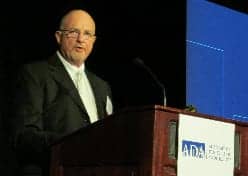Summary:
The Academy of Doctors of Audiology (ADA) is advocating for major reforms in hearing healthcare coverage, emphasizing the need for stronger regulations to ensure patients receive essential audiologic services rather than being subjected to profit-driven hearing aid sales.
Key Takeaways:
- ADA’s position statement calls for hearing benefit plans to be classified as health benefit plans to ensure proper regulation and oversight.
- The organization highlights gaps in current hearing healthcare policies that prioritize sales over patient-centered care.
- ADA is mobilizing audiologists, consumers, and policymakers to push for legislative changes to enhance patient access to quality, evidence-based hearing care.
The Academy of Doctors of Audiology (ADA) released a seminal position statement, A Call to Action on Coverage of Hearing Care: Principles for Public Policies that Optimize Patient Outcomes, advocating for substantial reforms in public policy and insurance regulations governing hearing healthcare coverage.
“Hearing benefit plans and third-party administrators often place hearing aid sales over patient care, undervaluing essential diagnostic and rehabilitative services,” says Stephanie Czuhajewski, MPH, CAE, executive director of ADA. “Because of disparities in oversight of hearing health coverage schemas, patients are frequently left without crucial audiologic services, severely undermining their health and quality of life.”
A Call to Action on Coverage of Hearing Care: Principles for Public Policies that Optimize Patient Outcomes highlights gaps in accountability for hearing benefit plans and related TPAs, when compared with other benefit programs for medical, vision, and dental coverage, and proposes 30 specific reforms. According to ADA, the most important reform is simply to require hearing benefit plans and TPAs to be classified as “health benefit plans” or a similar classification that will require them to register with each state and be subject to the purview of the State Insurance Commission or similar entity, so that they can be fully regulated as insurance.
“These recommendations support the Audiology 2050 Initiative, which prioritizes patient well-being as its core tenet,” says ADA President Amyn Amlani, PhD. “ADA believes that audiologists should be empowered to provide care based on evidence-based practices and medical necessity, rather than restrictive, one-size-fits-all hearing benefit plans. For example, ADA believes that the fitting fee that an audiologist earns should be based on the type and complexity of the services that they deliver, rather than the type, brand, or price of the hearing aid that they select for the patient—and ADA also firmly believes that consumers and policymakers will agree.”
Not only does A Call to Action on Coverage of Hearing Care: Principles for Public Policies that Optimize Patient Outcomes set forth clear policy recommendations to protect both patients and audiologists, it sets forth a meaningful call to action and a pledge to advocate for these reforms at the state and federal level.
“It’s time for us step up and stand up to unfair policy and trade practices, and it’s time for policymakers step forward to ensure that consumers with hearing loss have access to safe, effective, and affordable hearing care,” says Dr Amlani.
ADA is seeking volunteer “AuDvocates” to support this policy initiative, emphasizing that broad-based involvement is essential for meaningful legislative and regulatory change. The organization is encouraging consumers, audiologists, and other key stakeholders to volunteer. For more information or to volunteer, contact Stephanie Czuhajewski at [email protected] or at (859) 321-1595.
About the Academy of Doctors of Audiology
The Academy of Doctors of Audiology (ADA) is dedicated to the advancement of practitioner excellence, high ethical standards, professional autonomy, and sound business practices in providing quality audiologic care. For additional resources, or to join, visit www.audiologist.org.





